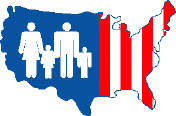 |
Americans Against Unfair Family Taxation |
| AAUFT Privacy Policy |
Las Vegas Review-Journal
Tuesday, November 2, 1999
The death tax
BY TIM HAMMONDS
When an Idaho cattle rancher died in a farm machinery accident six years ago, his family was devastated. Their loss was compounded when, shortly after his death, their estate attorney told them, "There is no way you can keep this place."
His wife and children sat in shock as their attorney described the estimated $3.3 million in estate taxes that would be due when his wife died. As a result, the family has begun selling off pieces of the 2,600-acre ranch to pay at least part of the estate taxes and avoid a fire sale at the end.
Sadly these days, this situation is all too typical. Having grown up on a dairy farm and worked with small businesses all my life, I'm well aware of the enormous burden the estate tax places on families. And it often has a wrenching effect well beyond the business owner's family. The death tax forces small business owners to redirect resources away-from expanding the business and toward estate planning. When family businesses go under, numerous local jobs go with them.
In fact, 91 percent of businesses in the United States are family-owned. But a majority fail after the founder dies -- and in nine out of 10 cases because the children cannot afford to pay the estate tax. These are chilling statistics.
Is this any way to put money into the federal coffers? Thousands of hard-working, middle-class families continue to suffer dire consequences from the punishing estate tax, which demands up to 60 percent of their assets at the time of death.
As tragic as these cases are, the most insidious impact may be on those, ironically, who pay little or no estate taxes. Each year, millions of family businesses pay accountants, tax attorneys and estate planners to manage their assets to avoid the tax. For the estate taxes they cannot avoid, they pay hefty premiums on life insurance taken out just for that purpose.
The annual median cost of such life insurance policies alone exceeds $45,000 per business, according to research by the Family Enterprise Center of Kennesaw State College and the Center for Family Business at Loyola University. They also found that the typical family business pays more than $33,000 to have lawyers, accountants and other financial advisers perform the estate planning needed in minimizing the tax.
In 1998, families spent more than $20 billion to prepare for and comply with the estate tax, according to the Joint Economic Committee of Congress. The amount was nearly as much as the revenues the estate tax raised that year.
Thus, the family businesses that work hardest to avoid the one-time estate tax must pay, in effect, an annual tax. Hit particularly hard are the newly economically empowered, especially women and minorities who are increasingly likely to be entrepreneurs.
Who are the winners in the estate tax? There aren't any, unless you count the lawyers and estate planners who make a bundle helping people avoid the tax. The federal government certainly doesn't win. The estate tax raises barely over 1 percent of total federal tax revenues. And considering the revenue that might be gained had that money been hard at work in businesses, along with the revenues lost from tax avoidance strategies, many economists have concluded that the estate tax contributes almost no net revenue to the federal budget. Some have concluded that it even costs the federal government money.
Few acts of Congress would provide greater aid to family businesses than a reduction in the estate tax. Eliminating the estate tax would promote savings, create jobs and ensure the survival and growth of family-owned businesses. Let's stop the death tax and help small businesses continue to fuel the economy.
Tim Hammonds is president and CEO of the Food Marketing Institute and co-chairman of Americans Against Unfair Family Taxation.